
Maersk confirmed after pausing all of its containerships near the Red Sea, that it has determined to reroute approximately 20 vessels due to what it calls the “alarming” attacks and the “significant threat to the safety and security of seafarers.”
The world’s second-largest container shipping company follows a growing list of shipping companies including container carriers, oil tankers, LNG and LPG carriers, and car transports all reporting that they have begun to reroute vessels despite the U.S. announcement yesterday of a coalition task force.
The situation in the area around Yemen and the Red Sea appears relatively stable today after a series of attacks over the past few days. UK Trade Organizations received reports of one or two possible approaches by small boats today, December 19, but the crews did not see weapons and stated that the small boats withdrew. There are no reports of drone or missile attacks.
A spokesman for UK Prime Minister Rishi Sunak confirmed to Reuters that the UK is part of the task force and France announced its participation, but the UK said other than HMS Diamond it does not plan at this time to send additional vessels to the region. They highlighted that the U.S. has three warships now in the area while telling Reuters that the task force would have considerable capacity to deter future attacks and protect commercial shipping.
“We are pleased to see global governments reacting promptly,” Maersk said in its statement indicating that it is hopeful to stop the rerouting “in the near future,” but saying the timing for a resumption of service through the Red Sea “remains difficult to determine.”
Maersk reports that it had nearly 20 ships holding north and south of the Suez Canal and east of the Gulf of Aden. All will now be rerouted around Africa via the Cape of Good Hope. The company reiterated that it remains “deeply concerned about the situation,” and will consider its next steps. They are planning a case-by-case assessment for future sailings, which could include diversions via the Cape of Good Hope or further contingency measures.
Hapag-Lloyd is also launching a broad program of diverting ships to sail around the Cape of Good Hope and posting a real-time roster on its website. As of December 19, they are listing a total of 54 sailings stretching into 2024 that will divert while reporting it still has five vessels “drifting” at points near the Red Sea and Suez Canal.
“This will be done until the passage through the Suez Canal and the Red Sea will be safe again for vessels and their crews,” said a spokesperson for Hapag. The carrier along with CMA CGM cited clauses in their Bill of Lading / Sea Waybill Terms and Conditions and invoked Force Majeure to divert their ships.
Asian carriers are also among the companies announcing that they were altering their sailing plans, with announcements coming from Evergreen, HMM, Yang Ming, and Wan Hai. Taiwan-based Evergreen writes in its customer advisory, “Given the fierce escalation of the war situation in recent days, Evergreen will temporarily suspend Israel import and export service due to rising risk and safety considerations with immediate effect until further notice.”
Analysts highlight that all the planned diversions will require additional capacity for the carriers to maintain service. Lars Jensen, chief executive of Vespucci Maritime, estimated for Lloyd’s List that the diversions would require up to 1.7 million TEU and involve five to six percent of the sector’s capacity helping to reduce the current overcapacity for containerships.
Ryan Petersen, Founder and CEO of Flexport, a supply chain management and logistics company, wrote on X that his firm calculates 46 containerships have already been diverted. He said that a further 78 vessels had been paused and were “awaiting orders,” as the pause spreads through the container shipping segment. Petersen said his firm has more than 2,200 TEU impacted by the pause.
Diverting ships around Africa will add between 10 days and two weeks typically to their transit with a commensurate increase in fuel costs. Investors however also saw a positive as the efforts to protect the industry will absorb some of the overcapacity in the sector and they drove up the stock price of the major container firms. The stock prices of Maersk and Hapag while down on Tuesday are all up from their prices last week prior to the announcements that the carriers would be diverting their ships.















